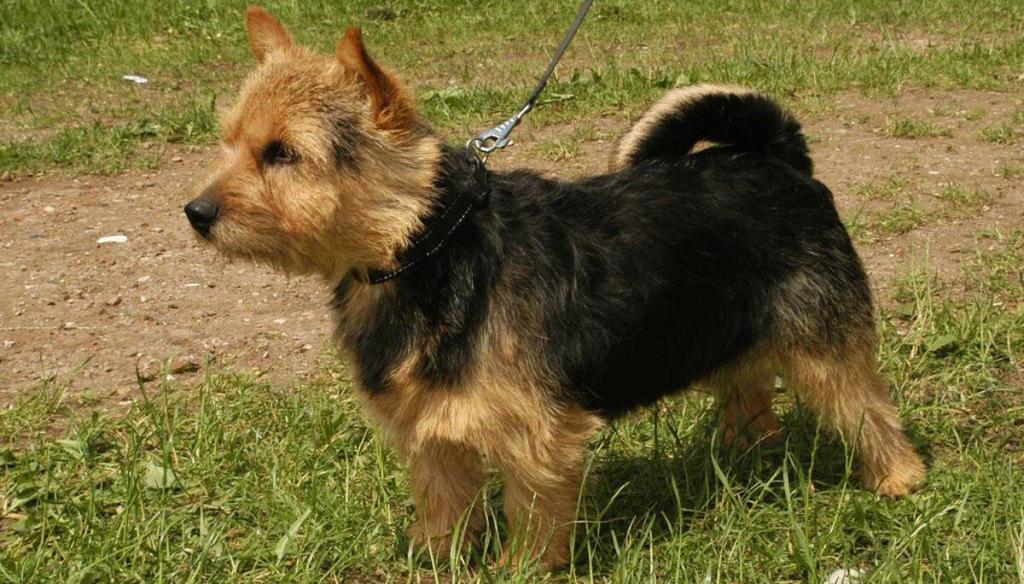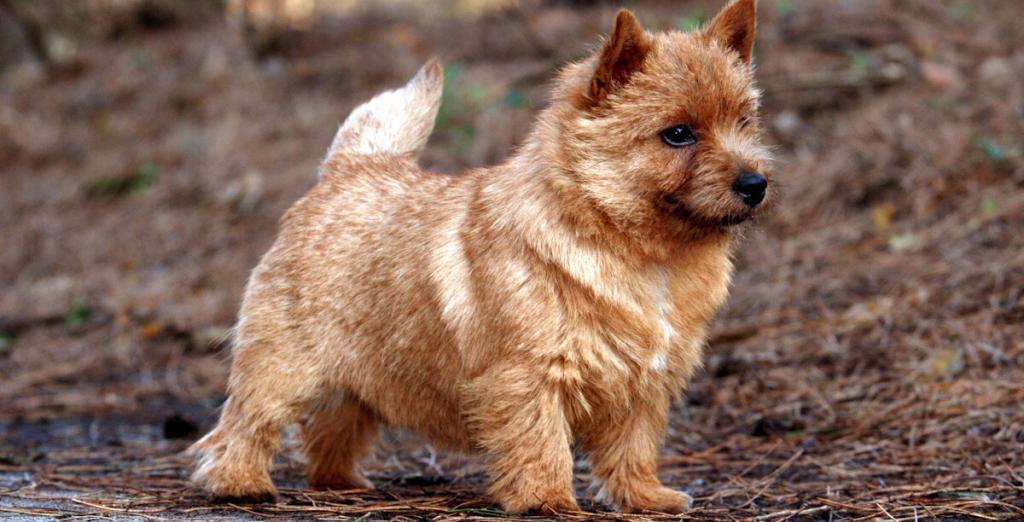Have you ever wondered what it’s like to share your life with a dog that combines a lion’s heart in a lapdog’s body? You needn’t look further than the Norwich Terrier, a breed that packs an enormous personality into a small package.
As you navigate the nuances of this breed’s character, you’ll find they’re fearless and affectionate companions, suited for those who appreciate a dog with a strong sense of independence and a dash of cheekiness. They’re intelligent and trainable, yet their willfulness can pose a challenge, requiring a consistent and patient hand.
Their adaptability makes them as comfortable in an urban apartment as in a country home, but what does it take to ensure their happiness and health? Stick with us, and you’ll discover how to cater to their physical and mental needs, ensuring that your Norwich Terrier lives a full and vibrant life by your side.
- Noise Level
- Energy
- Sociability
- Trainability
- Care
- Health
Overall
Summary
The Norwich Terrier is moderately energetic with a balanced sociability level. They are relatively trainable and require moderate care to maintain their health.
Norwich Terrier: Traits, Temperament, and Care Guide
Embodying tenacity and affection, Norwich Terriers boast a set of traits that make them ideal companions for those willing to meet their grooming and healthcare needs. Considering this breed, understand that they possess a high prey drive and require consistent mental stimulation to remain well-balanced.
A comprehensive care guide for your Norwich Terrier should prioritize daily exercise, ensuring their energetic nature is channeled positively. Regular grooming is essential, particularly hand-stripping their weather-resistant double coat to maintain its condition and manage shedding.
While often considered hypoallergenic, Norwich Terriers can experience health issues such as Norwich Terrier Upper Airway Syndrome (NTUAS), epilepsy, and neurological disorders. Proactive care and vigilance can help manage these conditions, securing a healthy life for your Norwich companion.
Exploring the Characteristics of the Norwich Terrier
As you acquaint yourself with the Norwich Terrier’s care requirements, let’s examine the distinctive characteristics that define this spirited breed. Known for its compact body, the Norwich Terrier is a small, energetic breed that exudes tenacity and fearlessness. Its prick ears and expressive eyes are key features, aligning with the breed standard that emphasizes a sturdy and alert appearance.
| Characteristic | Detail |
|---|---|
| Coat | Weather-resistant, requires regular grooming |
| Hypoallergenic Qualities | Minimal shedding, suitable for allergies |
| Health Considerations | Prone to Upper Airway Syndrome, epilepsy |
Despite their small size, they’re hearty and adaptable, thriving in various homes, from apartments to houses with yards. However, to maintain their vivacious lifestyle, they should be mindful of potential health problems and ensure regular veterinary check-ups.
Norwich Terrier: A Comprehensive Profile and Guide
As you consider the Norwich Terrier for your next companion, be prepared for a dedicated search due to their rarity and breeder waiting lists.
Their distinctive double coat necessitates a consistent grooming regime, including hand stripping to preserve its quality.
Remember that despite being promoted as hypoallergenic, Norwich Terriers can suffer from specific health conditions, warranting a thorough understanding of their medical needs.
Everything You Need to Know
Delving into the world of Norwich Terriers reveals a breed that demands careful consideration and dedication. They have specific grooming needs and potential health issues.
Here’s what you need to understand:
- Demand for Norwich Terriers: They’re a small, sought-after breed recognized by the American Kennel Club, often with long waiting lists for Norwich litters.
- Grooming Requirements: Regular grooming, including hand stripping, is essential to preserve the coat’s texture and vibrant color.
- Health and Wellness: Be vigilant for signs of Upper Airway Syndrome and neurologic disorders, prevalent in this breed.
- Training and Socialization: Implement proper training and socialization early, using positive reinforcement to mold your Norwich into a well-rounded companion.
Fostering a sense of belonging begins by embracing these tenets for your Norwich Terrier’s lifelong welfare.
Discovering the Temperament
Norwich Terriers are lively and friendly companions. They are known for their active disposition, which requires consistent mental and physical engagement to remain content. Their temperament is a blend of independence and sharp wit, so you’ll need to provide ample mental stimulation to keep them from becoming willful and stubborn.
When properly socialized, a Norwich Terrier is a good match for families or individuals who understand the breed’s needs. Their working instinct is strong, and without sufficient daily exercise—ideally an hour or more—they might resort to barking or other undesirable behaviors.
These energetic dogs can thrive in any size home, from apartments to houses with sprawling gardens, as long as their physical and mental requirements are met.

Norwich Terrier: Is It a Good Fit for Families?
You may wonder if a Norwich Terrier is the right addition to your family dynamic.
With their energetic and generous nature, these terriers can integrate well into households with older children, given they receive early socialization.
However, it’s essential to consider the breed’s grooming needs and the potential for specific health concerns when determining their fit for your family lifestyle.
Assessing Norwich Terrier’s Compatibility with Families and Kids
When considering a Norwich Terrier as a family pet, it’s crucial to recognize that their compatibility with children hinges on early and consistent socialization. Here’s what you need to consider:
- Socialization is Key: Norwich Terriers must be introduced to children early on. The Norwich Terrier Club recommends structured play to foster a good relationship.
- Good with Well-Behaved Children: Children should never treat a Norwich roughly. The breed thrives with considerate kids who respect their boundaries.
- Suited for Older Children: Given their energetic nature, Norwich Terriers are a better match for families with older children who can participate in their mental and physical activities.
- Training and Engagement: Norwich Terriers learn quickly and benefit from obedience training, which helps channel their energy positively. Commitment to their development is essential, especially for families with a small litter.
Norwich Flexibility in Living Spaces
Despite their small stature, Norwich Terriers exhibit remarkable adaptability to a range of living environments, from compact city apartments to spacious suburban homes, provided they’ve access to a secure area for daily exercise.
Your Norwich Terrier’s flexible nature allows it to adjust to apartment living with ease. Though small, it’s an active breed that requires ample exercise to prevent destructive behaviors. An hour or more of daily physical activity is crucial for its well-being.
With their characteristic pricked ears perked with curiosity, Norwich Terriers can thrive in various living spaces. Ensuring their compact bodies get the movement needed, you’ll find they’re as content in a cozy flat as in a sprawling yard, making them a truly versatile companion.
Norwich Terrier Training Essentials
As you train your Norwich Terrier, it’s crucial to prioritize consistent positive reinforcement to align with their independent streak.
You must integrate socialization practices early on, ensuring your Norwich Terrier develops sound behaviors.
Incorporate ample mental challenges and regular physical activity into their routine to relieve boredom and maintain their well-being.
Effective Training Strategies
To effectively train your Norwich Terrier, consistently apply positive reinforcement techniques to foster obedient and happy behaviors. As endorsed by the Terrier Club of America, early socialization and training are paramount for your terrier to excel, not just at home but potentially in a dog show too. Engage your Norwich in activities stimulating their mind—working terriers like the Norwich thrive on challenges.
| Aspect | Strategy | Benefit |
|---|---|---|
| Positive Reinforcement | Praise and treats for good behavior | Encourages repeat of desired actions |
| Socialization | Exposure to various environments and dogs | Develops well-rounded and sociable traits |
| Mental Stimulation | Puzzle toys and interactive sessions | Prevents boredom and nurtures intelligence |
Exercise and Grooming Needs
Norwich Terriers require consistent grooming, including combing several times a week and hand stripping every two to two and a half months, alongside daily exercise to ensure their well-being. Their weather-resistant double coat maintains its vibrant color and texture with regular grooming. Engage in weekly brushing and occasional hand stripping, a meticulous process that preserves the coat’s harsh texture. While finding a skilled groomer for this task can be challenging, it remains essential to maintaining the breed’s iconic terrier appearance.
Your Norwich Terrier requires plenty of exercise, at least an hour daily, to remain healthy and content. Ensuring they get as much exercise as needed not only supports physical health but also aids in preventing issues like Airway Syndrome, a concern for many small breeds.

Health Considerations
When considering a Norwich Terrier, it’s crucial to be aware of its common health issues and expected lifespan. These dogs are predisposed to specific conditions like NTUAS and neurological disorders, which necessitate attentive care and monitoring.
A proactive approach, including selecting a reputable breeder and maintaining regular vet visits, is key to managing their health and ensuring a long, fulfilling life.
Common Health Issues and Lifespan
When considering a Norwich Terrier, it’s important to be aware that they typically enjoy a lifespan of 12-15 years, yet are susceptible to specific health issues such as Norwich Terrier Upper Airway Syndrome and various neurological conditions.
This dog breed, known for its compact size and energetic demeanor, can face a complex respiratory condition called Norwich Terrier Upper Airway Syndrome (NTUAS). This involves the larynx and may cause significant respiratory distress.
Neurological disorders, including epilepsy and Paroxysmal Dyskinesias, also pose a risk. These episodic movement disorders can affect your Norwich Terrier’s quality of life.
Other common health issues include hip dysplasia, patellar luxation, primary lens luxation, cataracts, and periodontal disease.
To safeguard their health, ensure regular veterinary check-ups and a balanced diet. Responsible breeding practices are essential for mitigating these health concerns.
Alternatives for Norwich Terrier: Cheerful and Energetic Small Terrier Breeds
Explore these breeds if you appreciate the Norwich Terrier’s cheerfulness and energy, perfect for those who enjoy spirited and lively small terriers.
| Similar Dogs | Short Description |
|---|---|
| Cairn Terrier | A fearless and energetic breed, ideal for active lifestyles. |
| Border Terrier | A small but tough terrier, valued for its affectionate nature and versatility. |
| West Highland White Terrier | Known for its bright white coat and energetic character. |
| Jack Russell Terrier | A small, energetic breed, known for its bold and hunting character. |
| Yorkshire Terrier | A tiny breed with a large personality, ideal for companionship and city living. |
Is Norwich Terrier the Right Dog for You?
Determining whether a Norwich Terrier suits your lifestyle requires carefully considering the breed’s long-term commitment and specific needs. Owning this breed means embracing a lifelong responsibility that shouldn’t be taken lightly. Proper socialization is crucial for your Norwich Terrier, especially around children, to ensure they develop a friendly disposition. Regular grooming will be part of your routine, including stripping dead hairs, so you’ll need a groomer adept at this task.
Understand the potential health issues that may arise, such as upper airway syndrome and neurologic disorders. If you’re not ready for puppyhood’s demands, consider adopting an older Norwich Terrier. When bringing home this breed, ensure you’re prepared to invest in spending time with your companion, as they shouldn’t be left alone for prolonged periods. To keep your Norwich Terrier happy, provide them with a sense of belonging and consistent care.
Conclusion
The Norwich Terrier is a pint-sized powerhouse brimming with vigor and zest. This breed thrives with consistent, gentle guidance and flourishes in a nurturing environment.
They’re a perfect urban companion, requiring modest space but ample activity. Meticulous grooming and regular checkups will keep them in fine fettle.
If you’re ready for a dynamic, albeit assertive, furry friend, the Norwich Terrier could be a delightful addition to your family tapestry.
